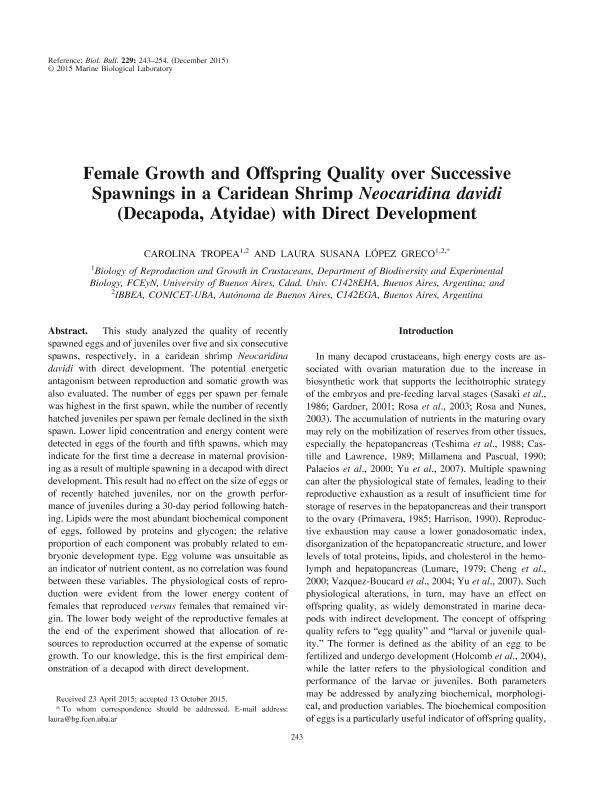Mostrar el registro sencillo del ítem
dc.contributor.author
Tropea, Carolina

dc.contributor.author
Lopez, Laura Susana

dc.date.available
2017-07-04T20:12:56Z
dc.date.issued
2015-12
dc.identifier.citation
Tropea, Carolina; Lopez, Laura Susana; Female Growth and Offspring Quality over Successive Spawnings in a Caridean Shrimp Neocaridina davidi (Decapoda, Atyidae) with Direct Development; Marine Biological Laboratory; Biological Bulletin; 229; 3; 12-2015; 243-254
dc.identifier.issn
0006-3185
dc.identifier.uri
http://hdl.handle.net/11336/19521
dc.description.abstract
This study analyzed the quality of recently spawned eggs and of juveniles over five and six consecutive spawns, respectively, in a caridean shrimp Neocaridina davidi with direct development. The potential energetic antagonism between reproduction and somatic growth was also evaluated. The number of eggs per spawn per female was highest in the first spawn, while the number of recently hatched juveniles per spawn per female declined in the sixth spawn. Lower lipid concentration and energy content were detected in eggs of the fourth and fifth spawns, which may indicate for the first time a decrease in maternal provisioning as a result of multiple spawning in a decapod with direct development. This result had no effect on the size of eggs or of recently hatched juveniles, nor on the growth performance of juveniles during a 30-day period following hatching. Lipids were the most abundant biochemical component of eggs, followed by proteins and glycogen; the relative proportion of each component was probably related to embryonic development type. Egg volume was unsuitable as an indicator of nutrient content, as no correlation was found between these variables. The physiological costs of reproduction were evident from the lower energy content of females that reproduced versus females that remained virgin. The lower body weight of the reproductive females at the end of the experiment showed that allocation of resources to reproduction occurred at the expense of somatic growth. To our knowledge, this is the first empirical demonstration of a decapod with direct development.
dc.format
application/pdf
dc.language.iso
eng
dc.publisher
Marine Biological Laboratory

dc.rights
info:eu-repo/semantics/openAccess
dc.rights.uri
https://creativecommons.org/licenses/by-nc-sa/2.5/ar/
dc.subject
Offspring
dc.subject
Quality
dc.subject
Broods
dc.subject
Atyidae
dc.subject.classification
Otras Ciencias Biológicas

dc.subject.classification
Ciencias Biológicas

dc.subject.classification
CIENCIAS NATURALES Y EXACTAS

dc.title
Female Growth and Offspring Quality over Successive Spawnings in a Caridean Shrimp Neocaridina davidi (Decapoda, Atyidae) with Direct Development
dc.type
info:eu-repo/semantics/article
dc.type
info:ar-repo/semantics/artículo
dc.type
info:eu-repo/semantics/publishedVersion
dc.date.updated
2017-07-04T15:33:28Z
dc.identifier.eissn
1939-8697
dc.journal.volume
229
dc.journal.number
3
dc.journal.pagination
243-254
dc.journal.pais
Estados Unidos

dc.description.fil
Fil: Tropea, Carolina. Consejo Nacional de Investigaciones Científicas y Técnicas. Oficina de Coordinación Administrativa Ciudad Universitaria. Instituto de Biodiversidad y Biología Experimental y Aplicada. Universidad de Buenos Aires. Facultad de Ciencias Exactas y Naturales. Instituto de Biodiversidad y Biología Experimental y Aplicada; Argentina
dc.description.fil
Fil: Lopez, Laura Susana. Consejo Nacional de Investigaciones Científicas y Técnicas. Oficina de Coordinación Administrativa Ciudad Universitaria. Instituto de Biodiversidad y Biología Experimental y Aplicada. Universidad de Buenos Aires. Facultad de Ciencias Exactas y Naturales. Instituto de Biodiversidad y Biología Experimental y Aplicada; Argentina
dc.journal.title
Biological Bulletin

dc.relation.alternativeid
info:eu-repo/semantics/altIdentifier/doi/http://dx.doi.org/10.1086/BBLv229n3p243
dc.relation.alternativeid
info:eu-repo/semantics/altIdentifier/url/http://www.journals.uchicago.edu/doi/10.1086/BBLv229n3p243
Archivos asociados
